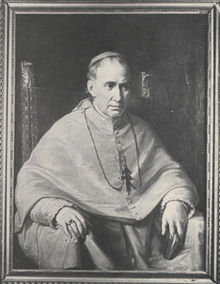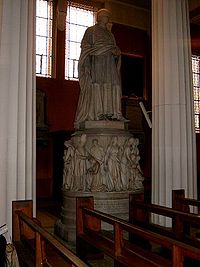- Paul Cullen (bishop)
-
For other people with the same name, see Paul Cullen (disambiguation).
His Eminence
Paul CullenCardinal Archbishop of Dublin
and Primate of Ireland
See Dublin Enthroned 1852 Reign ended 1878 Predecessor Daniel Murray Successor Edward MacCabe Other posts Archbishop of Armagh (1850-1852) Orders Ordination 1829 (Priest) Consecration 24 February 1850 (Bishop) Created Cardinal 22 June 1866 Rank Cardinal priest of S. Pietro in Montorio Personal details Born 29 April 1803
Narraghmore, County Kildare, IrelandDied 24 October 1878 (aged 75)
Eccles Street, Dublin, IrelandBuried Holy Cross College, Dublin, Ireland Denomination Roman Catholic Church Paul Cullen (29 April 1803 – 24 October 1878) was a Roman Catholic Archbishop of Dublin who became the first Irish cardinal.[1]
A trained biblical theologian and scholar of ancient languages, Cullen is best known for his crafting of the formula for papal infallibility at the First Vatican Council. He is largely credited for ushering in the devotional revolution experienced in Ireland through the second half of the 19th century and much of the 20th century.
Contents
Life
Early years
Cullen was born at Prospect, Narraghmore, County Kildare. His first school was the Quaker Shackleton School in nearby Ballitore. He was one of 16 children. Following the relaxation of some of the Penal Laws, his father, Hugh Cullen, had purchased some 700 acres (2.8 km2), giving him the status of a "strong" Catholic farmer, a class that greatly influenced 19th-century Irish society. They were fervent in their Catholicism and fearful of the sort of social unrest which had led to the failed 1798 Rising.[2][3]
Cullen entered St. Patrick's, Carlow College in 1816, and proceeded, in 1820, to the College of Propaganda in Rome where his name is registered on the roll of students on 29 November 1820. At the close of a distinguished course of studies, he was selected to hold a public disputation in the halls of Propaganda on 11 September 1828, in 224 theses from all theology and ecclesiastical history.[citation needed]
This theological tournament was privileged in many ways, for Pope Leo XII, attended by his court, presided on the occasion, while no fewer than ten cardinals assisted at it, together with all the élite of ecclesiastical Rome. Abbate Pecci, the future Pope Leo XIII, was present at the disputation. During his studies, Cullen acquired knowledge of classical and Oriental languages. He was later appointed to the chairs of Hebrew and Sacred Scripture in the schools of Propaganda, and receiving at the same time the charge of the famed printing establishment of the Sacred Congregation of Propaganda. This later charge he resigned in 1832, when appointed rector of the Irish College in Rome, but during the short term of his administration he published a standard edition of the Greek and Latin Lexicon of Benjamin Hedericus, which still holds its place in the Italian colleges; he also edited the Acts of the Congregation of Propaganda in seven quarto volumes as well as other important works.[citation needed]
Rector of the Irish College
In late 1831, Cullen was appointed rector of a fledgling and struggling Irish College. He successfully secured the future of the college by increasing the student population and thereby strengthening the finances of the college. He astutely fostered relationships with the Irish hierarchy, on whom he relied for students, often becoming their official Roman agent. This role yielded income and influence and was to remain a key function of future rectors. He endeavoured to chart a middle ground between conflicting parties of Irish bishops but usually found himself in agreement with Archbishop McHale of Tuam (as opposed to Archbishop Murray of Dublin) on the divisive issues of education and charitable bequests. He was active in his opposition to the establishment of the secular Queen's Colleges. This early alliance with McHale was however to be short-lived and the two men were to frequently clash swords over the forthcoming decades.[4]
While rector of the Irish College (1832–1850), Cullen was admitted to the intimate friendship of Gregory XVI and Pius IX. He profited by the influence which he thus enjoyed to safeguard the interests of the Irish Church and to counteract the intrigues of the UK diplomatic staff who at this period were lobbying the Vatican for support in European affairs.[citation needed]
During the revolution that marked the demise of the Papal States and the beginning of the Roman Republic, he accepted the position of rector of the College of Propaganda while retaining charge of the Irish College. Soon after his appointment the Revolutionary Trimuvirate issued orders that the College of Propaganda was to be dissolved and the buildings appropriated. The rector appealed to Lewis Cass, a United States politician, for the protection of the citizens of the United States who were students of the college. Within an hour, the American flag was floating over the Propaganda College. A decree was issued to the effect that the Propaganda should be retained.[citation needed]
Primate
Cullen was promoted to the primatial See of Armagh on 19 December 1849 and was consecrated by the Cardinal Prefect of Propaganda at the Irish College in Rome on 24 February 1850. He was transferred to the See of Dublin on 1 May 1852. He was elevated to the cardinalate as Cardinal Priest of San Pietro in Montorio in 1866, the first Irish cardinal.[5]
Cullen's first major act as Archbishop of Armagh was to convene the Synod of Thurles (1850), the first national synod held in Ireland since the Reformation. This occurred during the period of the debilitating Irish Famine which reduced the population of the country by over 2 million people through starvation, disease and emigration. The purpose of the synod was to establish a new ecclesiastical discipline in Ireland. Twenty-five years later, Cullen, once more presided at the national synod held in Maynooth in 1875. He recruited new clergy and the orders of lay religious celibate brother and sisterhoods. Cullen was particularly intent on promoting Roman Catholic controlled religious education in Ireland. His views on the national system of education in Ireland, given before the Earl Powis' Royal Commission in 1869, has been lauded by experts as a most complete statement of the Roman Catholic claims in the matter of primary education.[citation needed]
From the first days of his episcopate Cullen had planned and pursued a Roman Catholic university for Ireland. The university project was welcomed generally by the Irish at home and abroad and the beginnings of the institution in Dublin gave some promise. Cullen's intransigence, however, caused problems and the Catholic University of Ireland did not succeed.[citation needed]
Politics
In political matters Cullen made it a rule to support every measure, whatever its provenance, conducive to the interests of his vision for the Roman Catholic Church in Ireland. He condemned the ecumenical Young Ireland movement of 1848. He opposed the Fenian movement. He supported redress by constitutional means. The Gladstone government disestablished the Church of Ireland during his episcopacy. The Industrial Schools' Act, a huge boon to the laybrothers and sisters system of educational and institutional control was passed.[citation needed]
Cullen was a frequent visitor at the vice-regal lodge to lobby the government. In 1867, the Fenian leader, General Thomas F. Burke, had been sentenced to death and efforts to obtain a reprieve had been in vain. He had fought with distinction in the Civil War of the United States, and the UK government was determined to deter other skilled military leaders from enlisting with revolutionaries. The orders of execution from London were peremptory. The scaffold was already erected and the next morning General Burke was to be hanged. Through mediation from Archbishop Hughes of New York, and others, Cullen became convinced of the character of the accused and was able to obtain a grant of reprieve for Burke.[citation needed]
Cullen paid frequent visits to Rome. He took part in the definition of the dogma of the Immaculate Conception of the Blessed Virgin Mary in 1854, and with the eighteenth centenary of the martyrdom of Saints Peter and Paul in 1867. On these occasions he stayed at the Irish College.
During the Vatican Council, Cardinal Cullen took an active part in its deliberations. His first discourse in defence of the prerogatives of the Holy See, mainly on historical grounds, in reply to the Bishop of Rottenburg, was highly regarded by the placets (those in favour of the definition of the doctrine of Papal Infallibility). Towards the close of the council at the express wish of the Central Commission, Cardinal Cullen proposed a formula for the definition of Papal Infallibility. It was a matter of great delicacy, as promoters of the definition were split up into various factions, some anxious to assign a wide range to the pope's decisions, while others would set forth in a somewhat indefinite way the papal prerogative. Most accepted the form of definition proposed by Cullen.[citation needed]
He died in Dublin. His remains rest at Holy Cross Seminary at Clonliffe.
Legacy
Cullen is most notable today for being the first Irish Cardinal after 1,400 years of Christianity on the island.[6]
The improved condition of the Catholic Church in Ireland on his death in 1878, contrasted with what it was in 1850, afforded proof of the fruitfulness of Cullen's relentless zeal during his episcopate. Those twenty eight years marked a continuous period of ultramontane orthodoxy in matters connected with religion, discipline, government-funded education and charitable institutes.[citation needed]
Father Thomas N. Burke, O.P., wrote in the triumphalist language of post-Vatican I in 1878:"The guiding spirit animating, encouraging and directing the wonderful work of the Irish Catholic Church for the last twenty eight years was Paul, Cardinal Cullen, and history will record the events of his administration as, perhaps, the most wonderful and glorious epoch in the whole ecclesiastical history of Ireland."
Cullen also started the practice of Irish priests wearing Roman collars and being called "Father" (instead of "Mister") by their parishioners.[7]
Cullen has been credited with the revival of regular Catholic devotion in Ireland and what has been considered sexual repression. An extreme Ultramontanist, he vigorously opposed secret societies with revolutionary aims, as well as the system of mixed education then in force. His opposition was largely responsible for the failure of Gladstone's Irish Universities Bill in 1873, and he is held by some historians to have frustrated Cardinal John Henry Newman's plans for setting up a Catholic university along the lines proposed in Newman's The Idea of a University.[citation needed]
In James Joyce's Portrait of the Artist as a Young Man, Mr. Casey, a friend of the protagonist's father, mentions Cullen as one of the Catholic clergy who were very destructive to Ireland.[clarification needed][citation needed]
References
- ^ Miranda, Salvador. "Paul Cullen". The Cardinals of the Holy Roman Church. http://www.fiu.edu/~mirandas/bios1866.htm#Cullen. Retrieved 2009-06-23.
- ^ Paul Cardinal Cullen and the shaping of modern Irish Catholicism
- ^ Biodata at answers.com
- ^ Irish College.org
- ^ Larkin, Emmet (2004). "Cullen, Paul (1803–1878)". Oxford Dictionary of National Biography. Oxford University Press. http://www.oxforddnb.com/view/article/6872. Retrieved 2011-02-09.
- ^ By way of contrast, see the List of English cardinals.
- ^ Essay by David Kennedy The Catholic Church in Ulster since 1800, BBC publications, 1958, p. 178
External links
Catholic Church titles Preceded by
William CrollyArchbishop of Armagh
1849–1852Succeeded by
Joseph DixonPreceded by
Daniel MurrayArchbishop of Dublin
1852–1878Succeeded by
Edward MacCabeThis article incorporates text from the public domain 1907 edition of The Nuttall Encyclopædia.
Categories:- 1803 births
- 1878 deaths
- Irish cardinals
- Roman Catholic archbishops of Armagh
- Irish Roman Catholic bishops
- Roman Catholic archbishops of Dublin
- People from County Kildare
- 19th-century Roman Catholic archbishops
- Alumni of Carlow College
Wikimedia Foundation. 2010.

